![]() You are sitting in a cafe with a group of friends, talking about a particular issue in depth for about 30 minutes. Because you are on a caffeine buzz, you’ve covered multiple angles and multiple arguments about this issue, and while not everyone completely agrees on a particular perspective, everyone is eager to move on to the next topic (before ‘Hitler’ gets brought in to elevate the argument to absurdity). All of a sudden, some noob who just walked into the cafe and overheard a bit of your conversation, tries to join the conversation by saying something that someone had said fifteen minutes ago.
You are sitting in a cafe with a group of friends, talking about a particular issue in depth for about 30 minutes. Because you are on a caffeine buzz, you’ve covered multiple angles and multiple arguments about this issue, and while not everyone completely agrees on a particular perspective, everyone is eager to move on to the next topic (before ‘Hitler’ gets brought in to elevate the argument to absurdity). All of a sudden, some noob who just walked into the cafe and overheard a bit of your conversation, tries to join the conversation by saying something that someone had said fifteen minutes ago.
We do literature reviews because no one wants to be that irritating noob.
A literature review provides an overview of the published information about a particular ethnographic subject area or a body of specialized theory. Ethnographic subject areas (i.e., sports in Asia, Latino immigrants in the United States) specifically look at a particular cultural phenomena in a particular place, while specialized theory (i.e., sports and society, diaspora ethnicity) will address similar questions but in different ethnographic regions. Literature reviews can contain both, especially if your topic has been widely written on.
Like an academic research paper, it features a particular argument – but unlike an ethnographic research paper, the focus of your analysis will not be a particular social group or cultural practice, but a synthesis of what other social analysts have said. It is a useful step in the research process, because by reviewing the literature, you will be able to:
- Clarify the focus of your research by narrowing down the issues involved in your research
- Contextualize your own thinking with what others have said on the subject
- See what other questions you need to address
- Construct a deeper analytical framework for your project
A good literature review is comprehensive, in that a wide array of different perspectives and approaches are brought into discussion. It is also current, in that it contains the most up-to-date publications on your topic. A good literature review is analytical, in that it breaks down the field into categories of approaches, so that different themes or research questions become salient.
Source: sites.davidson.edu
You might also like:
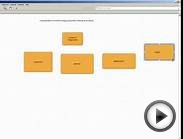
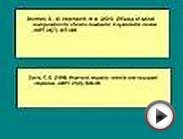
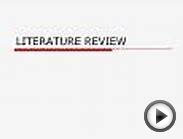
Related posts:
- Literature review outline
- Thematic literature review
- Thematic literature review Sample
- Thesis literature review outline
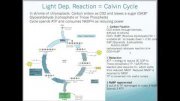




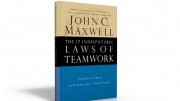
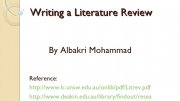

















Did you know that there are a million other (genuine) peer reviewed articles refuting your outmoded ideas? Do you even know what the phrase "peer reviewed" actually means? It does NOT mean allowing others of a similar persuasion to give their backing to an article, but allowing others to try to pick holes in a theory and test it to destruction. Preaching to the converted has never been part of the scientific method, and never will be. Looking at your rant from a Christian point of view is somewhat disquieting in that it implies that God tells lies by placing so much false evidence in th…